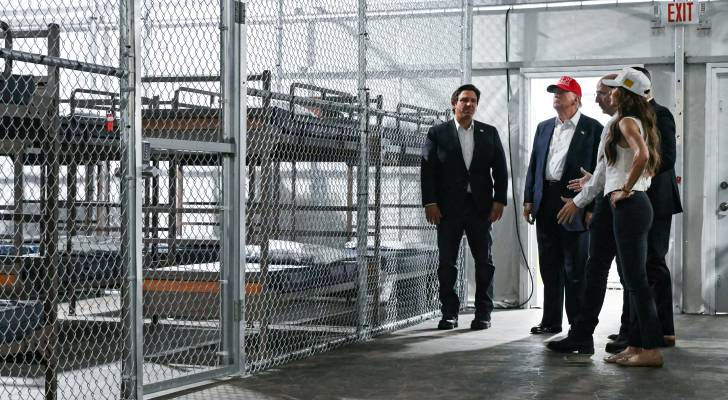
Mass deportation of immigrants and undocumented workers might come with an unexpected side effect: inflation.
That’s according to Moody Analytics’s chief economist Mark Zandi, who told Fortune [1] that if immigrants continue to be deported at the current rate, inflation will jump from 2.5% to 4% “by the time it hits its peak early next year.”
Zandi said that with a flat labor force and cheap foreign labor on the decline that’s “causing tightening in a lot of markets, adding to costs and inflation,” he warns that immigration-driven inflation is a supply-side shock.
In other words, it’s not easy to fix by changing the interest rate.
“Demand-side inflation has a different implication for monetary policy than supply-side inflation,” he told Fortune. “Rate cuts won’t bring more immigrants into the country.”
Trending Now
- Thanks to Jeff Bezos, you can now become a landlord for as little as $100 — and no, you don’t have to deal with tenants or fix freezers. Here’s how
- I’m 49 years old and have nothing saved for retirement — what should I do? Don’t panic. Here are 6 of the easiest ways you can catch up (and fast)
- Dave Ramsey warns nearly 50% of Americans are making 1 big Social Security mistake — here’s what it is and 3 simple steps to fix it ASAP
The impact of mass deportations
As part of a crackdown on people living in the country illegally, U.S. President Donald Trump has been stepping up deportations, averaging about 750 arrests per day [2].
The idea is to crack down on illegal border crossings, but even those who are legally in the country could be targeted by Immigration and Customs Enforcement (ICE). The number of people arrested with no criminal charges and then detained increased nearly 1,400% from January to June 15, according to unpublished ICE statistics reviewed by Reuters [3].
Zandi told Fortune that he estimates the number of immigrants in the country legally and those living here without legal permission has fallen from 4 million in 2023 to just 300,000 to 350,000 [4]. And he believes this is “significantly lifting the cost” in sectors that rely on this labor, such as construction, agriculture, manufacturing, hospitality and elder care, among others.
That tracks with findings from the Baker Institute [5], a non-profit, nonpartisan policy research organization, which found that three key sectors are heavily reliant on foreign-born workers: agriculture, the food supply chain and construction and extraction.
“Mass deportations could worsen labor shortages, with estimates suggesting a reduction of 1.5 million in construction, 225,000 in agriculture, 1 million in hospitality, 870,000 in manufacturing, and 461,000 in transportation and warehousing,” according to the Baker Institute.
“This would likely lead to higher costs, increased inflation, and slower economic growth, with states like California, Texas, and Florida facing the greatest impact.” For example, in California and Texas, immigrants make up 40% of the construction workforce.
The macro to micro impact
Some estimates [6] suggest that mass deportations could reduce the gross domestic product (GDP) by 2.6% down to 6.2% over the next decade.
If high inflation is mixed with stagnant economic performance, it could result in stagnation — a potent combo that means that goods are more expensive, but there are fewer jobs and lower incomes.
“Recent and proposed immigration policies will result in American families paying an additional $2,150 for goods and services each year by the end of 2028, or the equivalent of the average American family’s grocery bill for 3 months or their combined electricity and gas bills for the entire year,” according to an analysis by FWD.us [7].
This is estimated to increase the cost of food (impacted by the labor shortage in agriculture) by 14.5% and home ownership and rental costs (impacted by the construction worker shortage) by 6.1% from 2024 to 2028.
In other words, the average weekly grocery bill would jump from $165 to $195 and a new home “would rise from the 2024 average of $420,000 to $468,000 in 2028, a real shock to families looking to purchase a new home when housing is already largely unaffordable,” according to FWD.us.
Read more: Here are 5 ‘must have’ items that Americans (almost) always overpay for — and very quickly regret. How many are hurting you?
How to prepare your finances
During a period of high inflation or stagnation, it’s a good time to review your budget, tweak it where necessary and revisit it regularly (especially since trade policies and tariffs keep changing).
Maybe your grocery bill has gone up by 25%. Consider looking for ways to trim your budget (such as buying fewer brand-name products or buying more sale items) or reducing spending in other areas to make up the difference.
If you don’t have an emergency fund, it’s a good time to start one. You’ll want enough cash to help you get by for at least three to six months (or longer, if you’re worried about being laid off). That cash should be easily accessible, such as in a high-yield savings account.
Try to eliminate high-interest debt and home equity loans, and evaluate major purchases “such as a new car, a big wedding or expensive home renovations,” according to advice from Equifax [8]. “When possible, it’s best to make do with what you have until inflation eases and prices drop.”
When it comes to your investments, consider talking to your advisor about any concerns. You may want to realign your portfolio or diversify your investments to include more inflation hedge assets, such as commodities or real estate. Treasury Inflation-Protected Securities (TIPS) are another option, a Treasury bond that’s backed by the government to help you maintain your purchasing power.
Rising prices are never easy to manage, but the current wave of immigration policies adds a unique twist. While you can’t control national policy or global markets, you can prepare your household budget for the ripple effects. Staying disciplined now can help blunt the impact if mass deportations continue to strain supply chains and push everyday costs higher in the years ahead.
What to read next
- Robert Kiyosaki warns of a ‘Greater Depression’ coming to the US — with millions of Americans going poor. But he says these 2 ‘easy-money’ assets will bring in ‘great wealth’. How to get in now
- The ultrarich monopoly on prime US real estate is over — use these 5 golden keys to unlock passive rental income now (with as little as $10)
- This tiny hot Costco item has skyrocketed 74% in price in under 2 years — but now the retail giant is restricting purchase. Here’s how to buy the coveted asset in bulk
- Want an extra $1,300,000 when you retire? Dave Ramsey says this 7-step plan ‘works every single time’ to kill debt, get rich in America — and that ‘anyone’ can do it
Stay in the know. Join 200,000+ readers and get the best of Moneywise sent straight to your inbox every week for free. Subscribe now.
Article sources
At Moneywise, we consider it our responsibility to produce accurate and trustworthy content people can rely on to inform their financial decisions. We rely on vetted sources such as government data, financial records and expert interviews and highlight credible third-party reporting when appropriate.
We are committed to transparency and accountability, correcting errors openly and adhering to the best practices of the journalism industry. For more details, see our editorial ethics and guidelines.
[1]. Fortune. "Trump is deporting so many immigrants that it could cause inflation to hit 4% next year, top economist says"
[2]. Reuters. "Trump’s immigration enforcement record so far, by the numbers"
[3]. Reuters(https://www.reuters.com/world/us/trumps-ice-arrests-non-criminals-despite-crime-focused-message-2025-06-13/). "Trump’s ICE arrests non-criminals despite crime-focused message"
[4]. Fortune. "Trump is deporting so many immigrants that it could cause inflation to hit 4% next year, top economist says"
[5]. The Baker Institute. "Social and Economic Effects of Expanded Deportation Measures"
[6]. Carsey School of Public Policy. "The Economic Impact on Citizens and Authorized Immigrants of Mass Deportation"
[7]. FWD.US. "Prices for all Americans are set to unnecessarily rise under recent and proposed immigration policies impacting the U.S. labor force"
[8]. Equifax. "How to Help Protect Yourself Against Inflation"
This article provides information only and should not be construed as advice. It is provided without warranty of any kind.


